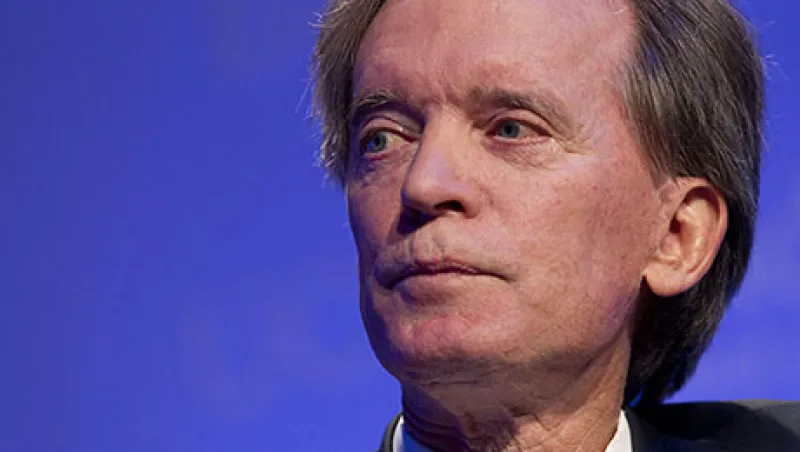Friday's announcement that Bill Gross left fixed-income giant Pacific Investment Management Co. to join Janus Capital Group has roiled the markets and angered investors. Janus is a growth equity investor that made its name during the dot-com era (and has needed a couple of turnarounds since) and is virtually unknown in bond investing. Institutional investors and financial advisers are livid that Gross is leaving them with captainless funds at PIMCO that are sure to lose value amid the volatility that he himself is causing. Indeed, there could be almost no worse time for investors to lose their chief: Interest rates are at historic lows and the market can only get more volatile from here. In a note to clients today, research firm Sanford C. Bernstein forecasted that PIMCO could lose 10 to 30 percent of its $1.9 trillion in assets as investors race to the exits to avoid being the last shareholders standing in its funds. A number of fixed-income managers confirmed that investors are asking for urgent meetings to discuss if they have capacity and other issues. PIMCO Total Return alone has $222 billion, down from $293 billion in 2013.
The past year hasn’t been easy for Gross, who co-founded PIMCO in 1971. Investors have taken a microscope to his fight with former PIMCO CEO and co-CIO Mohamed El-Erian over succession at the firm, his volatile personality and management style, and his rants in his shareholder letters, which were once eagerly awaited as financial scripture. They have also been trying to figure out if their trust in Gross — the ultimate star manager — was always misplaced or if he just ran out of steam and ideas as the 30-year bull market in bonds is coming to an end. Gross, after all, was called the “hot hands” in bond management in 1980 just about the time Federal Reserve chief Paul Volcker was declaring his war on double-digit interest rates. The star power and seeming infallibility of Gross’s bond prognostication rose just as rates declined steadily, increasing the value of his assets. Investors loved his mania. And he was candid about his idiosyncracies. In an interview in 2011 when Institutional Investor honored Gross with its Lifetime Achievement Award, he said, “I’m obsessively game oriented, and that’s my — it’s not a problem, it’s just a driver. It’s the same thing that drove me to Vegas to prove that I could play blackjack and beat the house.”
However, as Gross’s mistakes piled up — a wrong call on U.S. Treasuries in 2013 and being wrong on the timing of the Fed’s scaling back its bond purchases that same year — investors had little patience and started pulling billions of dollars out of his funds. Now his departure has investors thinking about who is making decisions on their funds and how captive they are to a handful of people. The star power of managers is infectious — until it’s not.
Gross’s abrupt departure from PIMCO is another sign that the bull market in bonds has run its course. He’s not joining Janus to manage a benchmark-oriented strategy, a move that worked for 30 years. Instead, he’ll be running money for a fledgling unconstrained bond fund and similar investments at Janus. Like their names imply, unconstrained funds allow their managers to invest in securities around the globe, use short positions and forget benchmarks like the Barclays U.S. Aggregate Index, which are now dominated by interest rate risk. Unconstrained funds have been the industry’s answer — at least so far — to changes in the bond markets that pose huge risks to investors in fixed-income securities. Since the financial crisis, central banks around the globe have used a variety of policies to keep rates at historic lows. As a result, tools learned during the long bull market are no longer working. Some market pundits have gone as far as to say that this generation of fixed-income managers should retire.
Gross does have some experience in unconstrained investing. He took over PIMCO’s Unconstrained Bond Fund at the end of 2013. According to Summit, New Jersey–based Markov Processes International, however, PIMCO Unconstrained Bond Fund’s performance shows higher correlation to the firm’s Total Return Fund than to some of its largest peers in the nontraditional category over the past year. In fact, Gross made the same wrong call on the Fed’s scaling back of quantitative easing in both funds.
Any thought that Gross might retire has been dispelled with the move to Janus. Investors, for their part, think he’s got plenty of energy. Janus’s stock rose more than 40 percent on the news today.
“The older you get the faster and faster and faster you’ve got to keep rowing,” he told II in 2011. “At some point you know your arms are going to give out. So yeah, one day I’ll pack it in, but it will be my body, not my mind.”
Follow Julie Segal on Twitter at @julie_segal.







